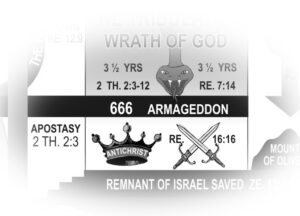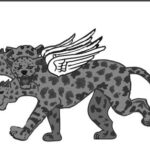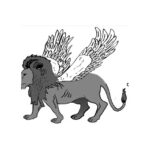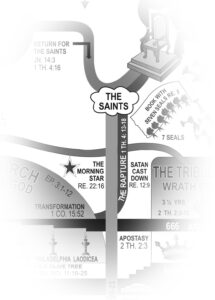 ‘After These Things’ Chapter 4.6 Ecclesiastical and Civil Apostasy
‘After These Things’ Chapter 4.6 Ecclesiastical and Civil Apostasy
From our book ‘After These Things – Summaries of John Nelson Darby’s Papers on Prophecy – and more…’ Compiled by Daniel Roberts. For more about this book click on the picture or CLICK HERE
Beast, Antichrist and False Prophet
A summary of the First Lecture by J N Darby on the Present Hope of the Church – Geneva 1840 entitled ‘The Two Characters of Evil: Ecclesiastical Apostasy, and Civil Apostasy‘
4.6 Ecclesiastical and Civil Apostasy
The Mystery of the Woman and the Beast
Ecclesiastical Wickedness is always the Worst
Civil apostasy will have its time of manifestation
The Two Characters of Evil
There are two characters in the evil which manifests itself on the earth:
- Ecclesiastical apostasy, that of the Church
- Civil apostasy, that of human government and organisation.
The angel gave Daniel the interpretation of the vision of the four beasts
- The lion Babylon
- The bear Persia
- The leopard Greece
- The ‘dreadful and terrible beast’ Rome
‘These great beasts, which are four, are four kings, which shall arise out of the earth. But the saints of the Most High shall take the kingdom, and possess the kingdom for ever, even for ever and ever. … Thus he said, The fourth beast shall be the fourth kingdom upon earth, which shall be diverse from all kingdoms, and shall devour the whole earth, and shall tread it down, and break it in pieces. And the ten horns out of this kingdom are ten kings that shall arise: and another shall rise after them; and he shall be diverse from the first, and he shall subdue three kings’ (Daniel 7:16-27).
The principal subject of the above scripture is fourth great beast. This represents the Roman Empire who exalts and elevates itself against the Most High God.
The Beast
 The civil power will rise against Christ, whom God will establish King over the earth because all government belongs to Him.
The civil power will rise against Christ, whom God will establish King over the earth because all government belongs to Him.
‘I … saw a beast rise up out of the sea, having seven heads and ten horns, and upon his horns ten crowns, and upon his heads the name of blasphemy. … And I saw one of the heads, as it were wounded to death.’ (Revelation 13:1-3). Although the imperial form of the Roman Empire collapsed centuries ago, the wound has been healed. The governing institutions the Roman empire can be re-established.[1]. The imperial beast will reappear, and the European ‘kings’ (whether monarchs or presidents) will willingly hand over their power to the beast.
The Antichrist
The course of Christianity takes place during the time of the fourth beast, Rome. At the same time, there is moral rebellion. The ecclesiastical power assumes the position of God. It takes away faith, putting aside natural religion, corrupting and perverting the revelation of God, so that men should have no other objects than themselves.
However, the ecclesiastical power will itself fall victim to the violence of the human will. By its pretensions to religion, it will openly serve Satan. It will provoke crimes which the the civil power will execute.
The corruption of the church is the worst of all corruptions. The Antichrist will deny that Jesus is the Christ; he will ‘deny the Father and the Son’ (1 John 2:22). Satan will work directly by him. It will be a sort of satanic imitation of what God has done.
In the way that the Father has given the heavenly throne to the Son; the dragon (Satan) will confer the throne in the evil world to the beast.
The Spirit acts in the church, according to the power of the Son before Him; similarly, the second beast, the Antichrist will exercise all the power of this last beast (civil authority) before him. ‘And he exerciseth all the power of the first beast before him and causeth the earth and them which dwell therein to worship the first beast, whose deadly wound was healed’ (Revelation 13:12).
Christendom is practically apostate. Darby said this in 1840 – what is its state now?
The False Prophet
There is also another beast (not the Roman Empire) which exercises all the power of the first beast before him.
‘I beheld another beast coming up out of the earth; … And he doeth great wonders, … and deceiveth them that dwell on the earth’ (Revelation 13:11-14). This second beast, the false prophet, will seduce the inhabitants of the earth (the Jews accepting a Satanic form of Christianity[2]). This has the appearance of Christ’s power, but it is Satan’s. The false prophet, who will have lost secular power, will cause them to follow the first beast, that is the civil power of the Roman Empire.
Satan, having been cast out of heaven, will come down to the earth in great wrath. Then, under his influence, the beast (the Roman Empire, the civil power) will resume his strength and form. Instead of being in submission to God, it will take on the character of Satan in open revolt against the power of God. Instead of replacing it, ten kings ‘shall give their strength and power unto the beast’. (Revelation 17:13). ‘Neither shall he regard the God of his fathers, nor the desire of women[3], nor regard any god: for he shall magnify himself above all’ (Dan 11:37).
There will be the eighth king, yet to come. In essence, this will be the beast himself, the imperial head under a new form. He will re-unite ten kings, who will give him their power. The kingdoms will continue in existence but as a confederation. After dealing in an idolatrous and apostate way in Jerusalem, he will find his end with that first beast – they will go down to destruction. (See Revelation 13, Daniel 11:36-45).
The Mystery of the Woman and the Beast
We get the woman clothed with scarlet (the whore). She represents the ecclesiastical power. She is mounted on the beast, which is the civil power. After that, ‘the ten horns[4] which thou sawest upon the beast, these shall hate the whore, and shall make her desolate and naked, and shall eat her flesh, and burn her with fire. For God hath put in their hearts to … give their kingdom to the beast.’ (Revelation 17:12-13)
The civil power turns on the ecclesiastical, resulting in the evident destruction of the latter
‘I will tell thee the mystery of the woman and of the beast that carrieth her, which hath the seven heads and ten horns. The beast that thou sawest was, and is not[5]; and shall ascend out of the bottomless pit, and go into perdition: and they that dwell on the earth shall wonder, whose names were not written in the book of life from the foundation of the world, when they behold the beast that was, and is not, and yet is[6]’. (v. 7-8)
Ecclesiastical Wickedness is always the Worst
The ecclesiastical power will no longer be wielding the secular arm, riding on the beast, and ruling it. It will take on a more mysterious and dangerous form. Its occult influence will continue, deprived of its outward splendour. The church’s revolt begins when, instead of being subject to Christ, it gives itself over to the will and power of man, leans upon man for aid, and renounces truth to follow error. When the church is not guided by the Holy Spirit, it is not subject to Christ, Christendom becomes completely apostate.
Because the ecclesiastical power is no longer a political power with the ability to depose kings and presidents, there is a temptation to suppose that it has disappeared. However, its moral influence survives. It seduces the inhabitants of the earth so that they acknowledge and worship the beast, at the same time urging the civil power to revolt against God. This will lead to its ultimate destruction (see below).
Civil apostasy will have its time of manifestation
Scripture teaches us that civil power is of God. ‘Let every soul be subject unto the higher powers. For there is no power but of God: the powers that be are ordained of God’ (Romans 13:1) – also 1 Peter 2:13-18.
Now, in the same way that the church will rebel against God, the civil government will be found in a state of revolt and apostasy. Instead of confessing allegiance to God, the source of its authority, it sets itself up against Him.
At the end of the present dispensation, the civil power will be found in this same state of revolt as the church. In the civil power, apostasy will be more manifest and prominent than it is in the church. This will take place in the bosom of Christendom, and ecclesiastical wickedness will be its motivating power.[7]
Those who will have revolted ought to have instructed the church and represented the wisdom of God, reminding governments of their duty towards God. They will conceal the truth, seduce the world, and lead the civil power to depart from God[8].
Relationship with the Jews
The beast, or the civil power of the fourth monarchy, sets himself in revolt against God. But this monarchy will establish a relationship with the Jews. This re-introduces the history of God’s people.
The unconverted Jews will have returned to their own land, though without being converted[9]. The Jews will find themselves in a relationship with the fourth beast who exalts himself against God, putting himself in direct opposition to Christ. Indeed, he will assume the rights that rightly belong to Christ, namely those of being the King of the Jews.
Persecution of the Jews
If we consider the history of the Roman beast comprehensively, both in its pagan form under the Roman emperors such as Tiberias Caesar, or in the form of the corrupted Christianity of the Middle Ages, we see there have always been persecutions against the faithful Christian saints. ‘And in her was found the blood of prophets, and of saints, and of all that were slain upon the earth,’ (Revelation 18:24).
However, after the Rapture of the church and the breaking of the Antichrist’s covenant with the Jews, the civil power will revolt openly, and persecutions will fall on God’s earthly people, the Jews. Remember, Christ remains King of the Jews. Of course, the church will be entirely out of the scene at the time of these persecutions.
The War in Heaven
The Word of God puts in contrast
- The world and the Father,
- The flesh and the Spirit,
- Satan and the Son of God.
Satan is now in heaven accusing the children of God. He aims to destroy Christ, and in doing so, destroy the church. However, Satan has no power over our consciences, his accusing power being rendered null by virtue of the blood and work of Jesus Christ. However, half-way through the seven years between the Rapture and the Appearing, there will be a battle in heaven – see Revelation 12:7-9. Michael will prevail; Satan will be cast out into the earth but will not yet be chained to the bottomless pit. It is said, ‘the devil is come down unto you, having great wrath, because he knoweth that he hath but a short time.’ (v.12)
Having been cast down to the earth, Satan will act through the terrestrial agency of the Roman Empire, though he will unite all the characters of the three previous beasts.
The authority of the dragon (Satan) becomes established in the Roman Empire. It is seen in the beast with seven heads and ten horns.
Armageddon
At Armageddon, the false prophet falls along with the beast. From the beginning to the end, there is always a beast, and with the beast a false prophet. It is the one or the other who guides the rebellion. But in the end, the beast takes the lead, as being able to act more directly and freely: thus, it is the beast that becomes the direct object of judgment.
Christ will finally exercise His rights as King of the Jews. He will come down from heaven, destroy the fourth beast together with the Antichrist.
A Word to the Believer
In the short time there, Paul had spoken a good deal about what was coming to the saints in Thessalonica. He had taught them to expect the Lord’s coming. After his departure, Satan tried to terrify them, by telling them that the day of the Lord had already arrived. So Paul said, ‘Now we beseech you, brethren, by the coming of our Lord Jesus Christ, and by our gathering together unto him, that ye be not soon shaken in mind’ (2 Thessalonians 2:1)
Those who love the truth will not be deceived by Satan’s activities. When the Lord calls His own, they will be caught up into the air. In time, the false prophet, (the second beast), will be thrown into the lake of fire along with the first. Then all those who have ‘not received the love of the truth’ (2:Thessalonians 2:10) will be judged. We need to warn people: may some be led to consider the word of God.
We may ask the question as to why all this is announced to us, the children of God, who thankfully, will see none of these things. It must surely serve to wean us from involvement with, and the influence of, what will come under judgment. May we be separate from all that drags men on to destruction!
May God make us attentive both to the character and the end of man’s pride! May God’s name of grace and glory be eternally blessed; and may He engrave these things upon our hearts! He will preserve His church from all these evils which menace the world for His church is united to Him.
[1] One can see that this would be quite easy when erstwhile sovereign states have already ceded much power to the European Union (established by the Treaty of Rome). However, let us not mix current affairs with prophecy – they are NOT the same. Darby likened Napoleon’s efforts to the Roman empire and that fell apart.
[2] I ask – what about the Muslims too? – Darby makes the point that the false prophet could not be Mohammed.
[3] An interesting question – what is meant by the desire of women?
[4] i.e. the ten kings.
[5] i.e the Roman civil power. The bottomless pit is the positive power of Satan.
[6] Darby reads ‘shall be present’, a better translation of the Greek παρέσται/parestai/Strong 3918 meaning present or near.
[7]When Darby says ‘the end of this dispensation’ it can be confusing as to the period he is referring to. Whereas most would see this dispensation ending at the Rapture, and the seven years either another dispensation or a transitional period, Darby considers this dispensation (as Savage did – see Chapter 1.3) to ending till the Lord’s coming to reign. That is why he refers to the ultimate apostasy of the professing church as belonging to this time.
[8] This is what Darby described when living in in Victorian England. How much more apt are these things now when ‘alternative lifestyles’ are promoted and offered to young children, homosexual marriage, abortion and divorce on demand have all gone in the face of God’s thoughts for mankind. And the church acquiesces to all of this.
[9] It is easy to regard the establishment of the Jewish state in 1948 as the fulfilment of prophecy. Whilst you could say that it was laying the scene for what is to come, there is no reason why this event along with the revival of the ten lost tribes could not be have been fulfilled after the Rapture. After all, the nation is in unbelief as to Christ, is secular in constitution and comprises only two of the twelve tribes.






